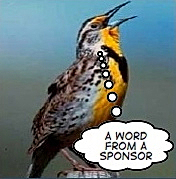* Shakespeare = Culture
| A colleague just turned me on to an editorial in the Omaha World Herald a few months back (23 June 2007 [7B]), by a professor at the University of Nebraska-Kearney who has set himself up as another Apostle of Culture, as one more Savior of High Literature. Doctor Thomas Martin laments the fact that students at the U of Nebraska-Lincoln don't even have to take a course in Shakespeare to acquire a major in English. I, too, lament the fact that English students (graduate students, more crucially) aren't exposed to all the major eras & figures of British and American literature. But I also think that they should have to read some Continental literature in translation (Dostoevski, Goethe, and the like); and maybe a course in Spanish(-American) lit., from Cervantes through García Márquez?; and some American Indigenous lit. would be a good idea, too. Ay, there's the rub: where should one stop, given the economic pressures that English departments currently face? In fact, Martin asserts that majoring in English sans Shakespeare is "comparable to a medical doctor who did not take a course in anatomy." This analogy is, first of all, completely absurd on the level of logical categories. But it also ignores the fact that Shakespeare himself, as literary historians remind us, was never the Great-Be-All-and-End-All of the English canon until well into the nineteenth century, and that the canon of "essential works" of which Martin speaks is itself a historically constituted body. This lack of historicity is Martin's main problem. For him, "literature" still has an "essential quality"; it is still "timeless," and its theme is an unchanging "human nature." (And someone play "God Save the Queen," while we're at it.) But literature, in reality, is always situated in place, and time, and ideology: there's never anything disinterestedly "eternal" about it. And yet he complains that English departments have turned "into sociology departments, emphasizing the topical literature of race, gender, class and ethnicity over the traditional works of literature." Huh? Shakespeare's corpus, too, we recognize, is a "topical" one, utterly involved in "race, gender, class and ethnicity." This recent turn of events—our "sociological" or political focus—is merely evidence that we are now conscious how all texts are inescapably complicit in such politics. Professor Martin also claims that the "faculty in most modern institutions of higher learning lack respect for their ancestors," who are —as is clear later in the editorial—the good ol' dead white English males. But ancestors is a strange word, when mine happen to include the non-white and non-European. Can't I be true to mine? (And all of them?!: what fun to teach Black Elk, and James Joyce, and Albert Camus in the same course!) Martin's entire argument, in sum, is quite an ethno/Eurocentric one. Other once-upon-a-time word choices that Martin tosses around include "liberal education," "spirit," "conscience," and "reasoned"—all of which smack of Matthew Arnold and other self-anointed Apostles of Culture—and all these all-too-humans have had their own self-interested, political reasons for appealing to such values! Our latest apostle here is finally so bold as to speak of the "moral in a classical work" as something of great use in one's Socratic "self-examination." Ah—for indeed, Martin finally admits—his "discipline is philosophy," after all, and his castigation of the English discipline arises from someone no doubt deeply immersed in a much higher calling than mere "literature," all mere shadows, sophistry, and illusion compared to his calling. We must thank him, then, for descending, if only momentarily, from the Clouds (. . . of Aristophanes). |

.jpg)


No comments:
Post a Comment